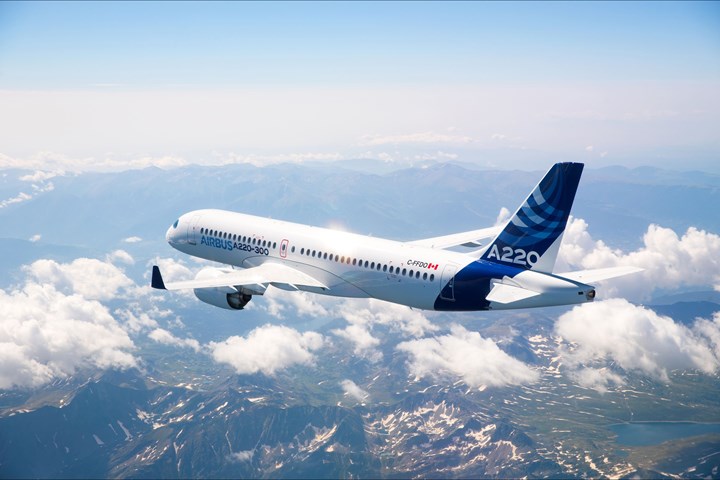FACC expands partnership with Airbus
Expanded empennage component production for A220 family positions FACC as an important long-term technology partner to Airbus, supports the company’s growth strategy for the future.

A220-300 mid-flight. Photo Credit: Airbus
FACC AG (Ried im Innkreis, Austria) has been a trusted partner for Airbus (Toulouse, France) for many years. As of June 2021, FACC reported that this partnership is to be further expanded with the production of empennage components for the largely composite A220 aircraft, supporting the company’s growth strategy for the future.
“The first product that FACC, which at that time was still the development department of Fischer Ski, developed for Airbus back in 1981 was a supporting rod for the floor crossbeams of the Airbus A300,” says Robert Machtlinger, CEO of FACC AG, commenting on the long-standing partnership with Airbus. “Now, 40 years later, we are represented on all aircraft platforms — the A220, A320, A330, A340, A350 and A380 — with our innovative, lightweight components for the wings and engines, the empennage and the passenger cabin. The new order is not only a sign of our expertise and good cooperation, but also an important indicator for the years to come. Together, we will work on the development of new solutions that will shape the future while implementing our climate and sustainability goals step by step."
With the production of empennage components of the A220 aircraft, FACC says it is further expanding its know-how and safeguarding attractive jobs and its prominent role as a leading company in the region. “In order to establish ourselves as an innovative, stable and reliable partner to Airbus as well as to other major customers, FACC has invested more than €500 million in its plants and in highly automated facilities over the past 10 years. This is also a commitment to the location and to our crew,” emphasizes Machtlinger. “The state of Upper Austria has always been at our side as a close partner during these challenging times. With the new order from Airbus, we are pleased to be able to create new jobs and thus sustainably strengthen the region.”
Further, the new order is expanding FACC’s close cooperation with Airbus in the Aerostructures segment. FACC is the sole supplier for the A220 rudder and elevator. The first components will be delivered in early 2022. With its consistent growth strategy and clear commitment to top performance, the aerospace group is breaking new ground together with its partners, with the goal of making international airspace not only safer and more efficient, but also more environmentally friendly and sustainable.
The project itself comprises the manufacture and assembly of the rudders and elevators. “Technological leadership as well as the move towards more complex aircraft structures is a central topic in the aircraft industry, and we have been working on this intensively for years. FACC has achieved an internationally leading role as a result of vigorous research and development work,” says Machtlinger. “This is certainly one of the main reasons why Airbus now uses FACC’s know-how for the empennage components of the A220.”
The elevators and rudders serve to control and stabilize the aircraft in the air, and therefore play a central role in the flight operations of the Airbus A220. The technical requirements for the production of the primary structural elements are naturally demanding and complex, according to FACC: With a length of 6.4 meters and a width of 1.9 meters, the production of the rudder, for instance, not only requires the utmost precision, but also high-level logistical management. A sophisticated manufacturing concept and the in-house production of the metal components at FACC by means of a highly efficient automated five-axis CNC milling machine will ensure compliance with the high technical requirements.
Related Content
The next-generation single-aisle: Implications for the composites industry
While the world continues to wait for new single-aisle program announcements from Airbus and Boeing, it’s clear composites will play a role in their fabrication. But in what ways, and what capacity?
Read MoreIndustrializing additive manufacturing in the defense/aerospace sector
GA-ASI demonstrates a path forward for the use of additive technologies for composite tooling, flight-qualified parts.
Read MorePlant tour: Airbus, Illescas, Spain
Airbus’ Illescas facility, featuring highly automated composites processes for the A350 lower wing cover and one-piece Section 19 fuselage barrels, works toward production ramp-ups and next-generation aircraft.
Read More“Structured air” TPS safeguards composite structures
Powered by an 85% air/15% pure polyimide aerogel, Blueshift’s novel material system protects structures during transient thermal events from -200°C to beyond 2400°C for rockets, battery boxes and more.
Read MoreRead Next
Next-gen fan blades: Hybrid twin RTM, printed sensors, laser shock disassembly
MORPHO project demonstrates blade with 20% faster RTM cure cycle, uses AI-based monitoring for improved maintenance/life cycle management and proves laser shock disassembly for recycling.
Read MoreUltrasonic welding for in-space manufacturing of CFRTP
Agile Ultrasonics and NASA trial robotic-compatible carbon fiber-reinforced thermoplastic ultrasonic welding technology for space structures.
Read MoreCeramic matrix composites: Faster, cheaper, higher temperature
New players proliferate, increasing CMC materials and manufacturing capacity, novel processes and automation to meet demand for higher part volumes and performance.
Read More












